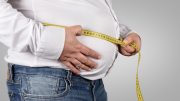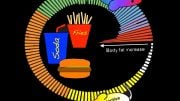
Recent research suggests that eating at night could contribute to your risk of obesity.
New research provides experimental evidence that late eating reduces energy expenditure, increases hunger, and changes fat tissue, all of which may raise the risk of obesity.
About 42% of adults in the United States are obese, which increases the risk of developing chronic diseases including diabetes, cancer, and other conditions. While popular healthy diet mantras warn against midnight snacking, few studies have thoroughly studied the combined impacts of late dining on the three key factors in body weight regulation and therefore obesity risk: calorie intake regulation, calorie burn, and molecular changes in fat tissue.
Researchers at Brigham and Women’s Hospital, a founding institution of the Mass General Brigham healthcare system, discovered in a recent study that the timing of meals has a big impact on our energy expenditure, appetite, and molecular pathways in adipose tissue. Their findings were recently published in the journal Cell Metabolism.
“We wanted to test the mechanisms that may explain why late eating increases obesity risk,” explained senior author Frank A. J. L. Scheer, Ph.D., Director of the Medical Chronobiology Program in the Brigham’s Division of Sleep and Circadian Disorders. “Previous research by us and others had shown that late eating is associated with increased obesity risk, increased body fat, and impaired weight loss success. We wanted to understand why.”
“In this study, we asked, ‘Does the time that we eat matter when everything else is kept consistent?’” said first author Nina Vujović, Ph.D., a researcher in the Medical Chronobiology Program in the Brigham’s Division of Sleep and Circadian Disorders. “And we found that eating four hours later makes a significant difference for our hunger levels, the way we burn calories after we eat, and the way we store fat.”
A total of 16 individuals with a body mass index (BMI) in the overweight or obese range were examined by Vujovi, Scheer, and their colleagues. Every participant completed two lab protocols: one with a rigidly planned early meal schedule and the other with the exact same meals, each set for around four hours later in the day.
Participants maintained set sleep and waking times for the last two to three weeks before beginning each of the in-laboratory protocols, and they closely followed similar diets and meal schedules at home for the last three days before entering the laboratory. In the lab, participants underwent regular body temperature and energy expenditure monitoring, frequent small blood sample collection throughout the day, and regularly recorded their hunger and appetite.
To measure how eating time affected molecular pathways involved in adipogenesis, or how the body stores fat, investigators collected biopsies of adipose tissue from a subset of participants during laboratory testing in both the early and late eating protocols, to enable comparison of gene expression patterns/levels between these two eating conditions.
Results revealed that eating later had profound effects on hunger and appetite-regulating hormones leptin and ghrelin, which influence our drive to eat. Specifically, levels of the hormone leptin, which signals satiety, were decreased across the 24 hours in the late eating condition compared to the early eating conditions. When participants ate later, they also burned calories at a slower rate and exhibited adipose tissue gene expression towards increased adipogenesis and decreased lipolysis, which promote fat growth. Notably, these findings convey converging physiological and molecular mechanisms underlying the correlation between late eating and increased obesity risk.
Vujović explains that these findings are not only consistent with a large body of research suggesting that eating later may increase one’s likelihood of developing obesity, but they shed new light on how this might occur. By using a randomized crossover study, and tightly controlling for behavioral and environmental factors such as physical activity, posture, sleep, and light exposure, investigators were able to detect changes in the different control systems involved in energy balance, a marker of how our bodies use the food we consume.
In future studies, Scheer’s team aims to recruit more women to increase the generalizability of their findings to a broader population. While this study cohort included only five female participants, the study was set up to control for the menstrual phase, reducing confounding but making recruiting women more difficult. Going forward, Scheer and Vujović are also interested in better understanding the effects of the relationship between meal time and bedtime on energy balance.
“This study shows the impact of late versus early eating. Here, we isolated these effects by controlling for confounding variables like caloric intake, physical activity, sleep, and light exposure, but in real life, many of these factors may themselves be influenced by meal timing,” said Scheer. “In larger scale studies, where tight control of all these factors is not feasible, we must at least consider how other behavioral and environmental variables alter these biological pathways underlying obesity risk. ”
Reference: “Late isocaloric eating increases hunger, decreases energy expenditure, and modifies metabolic pathways in adults with overweight and obesity” by Nina Vujović, Matthew J. Piron, Jingyi Qian, Sarah L. Chellappa, Arlet Nedeltcheva, David Barr, Su Wei Heng, Kayla Kerlin, Suhina Srivastav, Wei Wang, Brent Shoji, Marta Garaulet, Matthew J. Brady and Frank A.J.L. Scheer, 4 October 2022, Cell Metabolism.
DOI: 10.1016/j.cmet.2022.09.007
The study was funded by the National Institutes of Health, The Spanish Government of Investigation, The Autonomous Community of the Region of Murcia through the Seneca Foundation, and the American Diabetes Association.
During the execution of this project, Scheer received lecture fees from Bayer HealthCare, Sentara HealthCare, Philips, Vanda Pharmaceuticals, and Pfizer Pharmaceuticals; received consulting fees from the University of Alabama at Birmingham; and served on the Board of Directors for the Sleep Research Society. Scheer’s interests were reviewed and managed by Brigham and Women’s Hospital and Partners HealthCare in accordance with their conflict of interest policies. None of these are related to the current work. Vujović has been compensated for consulting services provided to the Novartis Institutes of Biomedical Research, also unrelated to the current work.









I can definitely attest to the link between eating late and gaining weight. For 6 years I tried eating healthy, exercising with camp gladiator, tried laser fat removal(this was a joke & $$ thrown), drinking more water, green tea, lits of salads, fruits, nuts, avocados, but I never tried to stop eating late.
I finally decided to eat what I wanted, but still heart healthy. I now have a large breakfast about 8am and then eat a large- healthy dinner. Meat, bread or tortilla, veggies, pasta, etc… I have a late lunch/dinner about 3pm.
I eat fresh fruit during the day. I quit popcorn, nuts, I eat on occassion, a dessert, ice cream, or buy me a small bag of chips. I gotta have a choc brownie about every 2 weeks. I got a puppy that forced me to go out and walk her. Without realizing it, I started putting in avg of 5,000 additional steps. I think this boosted my metabolism. My stomach used to growl when in bed, but I decided to ignore it. My parents always made sure we had food & clothing, so I decided I could do with less now. I’m not Diabetic nor have high BP, so that was not a concern for me. I have lost an avg of 3-5 lbs a month since April (35 lbs). My body is feeling stronger, My knees feel good, I have osteopenia & lower back problems since my 40s, so I try to eat eye, bone & heart healthy foods. My MD trys to keep my vit D level @ 50s, I take 1200 mg Ca++ daily, flaxseed oil daily. I am 66yrs. My goal is to loose 15-20 more lbs in next 5 months (by my 67th).
Occas, I have yogurt or cottage cheese with fruit about 7pm as a treat. I also use pure honey to sweeten my coffee and in my plain yogurt. And I stopped going out to eat dinner. I cook 80% of my food. NO soda pops.
My suggestion: Stop eating what you feel you “goota have” and that can be the special occas treat. And Stay hydrated.
So lots of changes in eating late. I really feel, That was the big difference that boosted 👊my metabolism & I treat myself to a restaurant meal, once every 2 weeks.😊
This report of a sample of only 16 people seems to contradict :
2022 Obesity Rate in US is 36.2%, Spain 23.8% (World pulation Review).
Typical US dinner time US 6-7 PM (Insider), Spain 9-11 PM (Travel+Leisure)
And there’s studies that dismiss this myth and actually suggest eating late means you make poor food choices and suffer from decision fatigue and you eat more. Calories are calories. They aren’t magically different because the sun went down. I highly, highly doubt this study can be reproduced and we should refrain from giving credit to small sample studies that haven’t been peer reviewed at all.